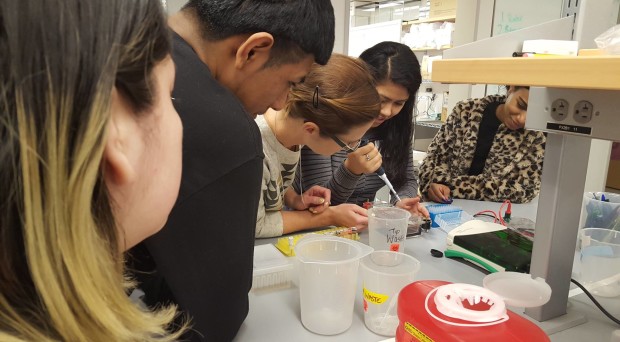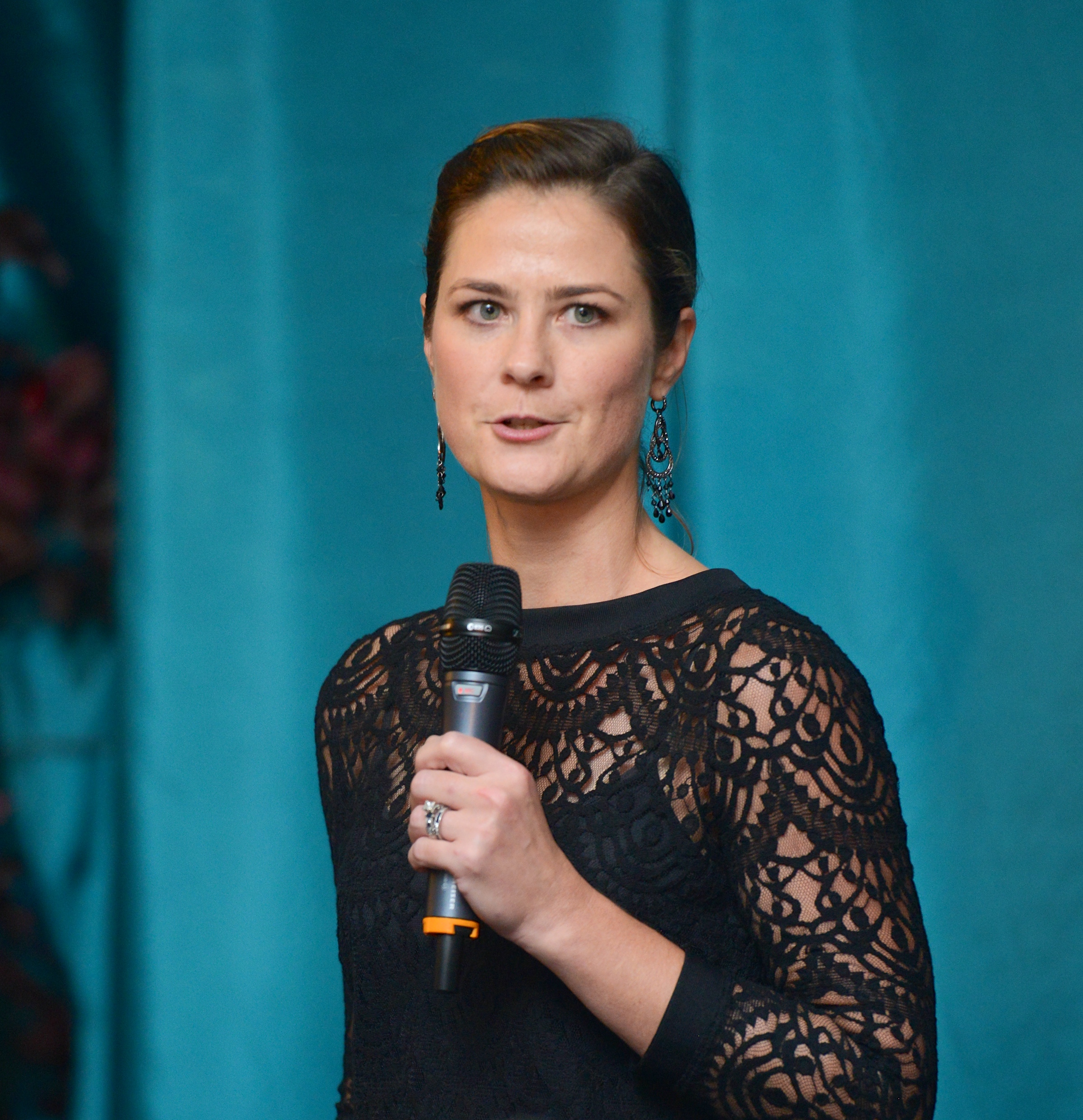
How did you get interested in science?
I sometimes joke that I was born with a pipette in my hand. I was one of those kids who knew they wanted to be a scientist from the very beginning, and a lot of my toys and role playing were somehow related to science.
At first, I thought I wanted to be a marine biologist, because I was really attracted to learning about dolphins and whales. But, as my understanding of science broadened, and more opportunities presented themselves, I thought that becoming a veterinarian was the way to go.
So, for several years during high school and college, I volunteered at local animal shelters, and worked as an assistant at a veterinarian office.
I got in touch with a local equine veterinarian and asked if I could shadow her. On the first day, which also ended up being the last day, I drove with her to different farms to examine a variety of horses.
Most of the appointments were pretty straightforward – regular checkups and treatments for arthritis. For the last appointment, we arrived at a horse-breeding farm, and the horse owner was concerned because his prized mare was not getting pregnant.
This examination was clearly going to be different than the ones the vet performed at previous appointments – I could tell because of the heavy box she needed from her pickup truck. She opened the box, and inside was a portable ultrasound machine and a large pair of rubber gloves.
 When I say large, I mean up to the shoulders. The vet proceeded to put the gloves on and approach the horse’s behind. She then began to literally disappear into the horses backside – I felt like only her lower half was visible!
When I say large, I mean up to the shoulders. The vet proceeded to put the gloves on and approach the horse’s behind. She then began to literally disappear into the horses backside – I felt like only her lower half was visible!
When she emerged, she brought with her handfuls of a brown, extremely pungent material. When we left, I was pretty much speechless. As a kid from the Bronx, this was a bit too up close to wildlife for me!
The next day I asked for a meeting with my biochem professor. I told her that I was switching my track from veterinary medicine to something that was not veterinary medicine, and I would love to try my hand at research. She took me on, threw a pipette in my hand, and I followed a path researching lipid metabolism from that day forward.
What is your scientific background?
As an undergrad at SUNY Geneseo, I worked on a directed study on high density lipoprotein (HDL). I found the scientific literature on lipid metabolism to be really fascinating, and it turned out that I had pretty good hands in the lab. Through this experience I realized that I wanted to pursue a research career in lipid metabolism.
When it became time to think about grad school, I applied to the Institute of Human Nutrition at Columbia University Medical Center. I landed in the laboratory of Stephen Sturley, where I used Saccharomyces cerevisiae to study the combined environmental and genetic mechanisms underlying lipotoxicity, or cell death due to lipid overload. Toward the end of this leg of my training, I still had grand plans to one day have my own laboratory. So I decided to do a postdoc.
To deepen my understanding of lipid metabolism, I sought a postdoc position with Jan Breslow at The Rockefeller University. I was extremely excited to be accepted into his lab, and took up a project to study protein-mediated intracellular cholesterol transport via the StAR family of protein transporters.
In addition to the incredible training a postdoc can receive at Rockefeller, there were many opportunities for me to get involved with extracurricular activities related to science.
In addition to the incredible training a postdoc can receive at Rockefeller, there were many opportunities for me to get involved with extracurricular activities related to science.
For instance, I served on the board of the student and postdoc run Biotech Forum, worked as an editor and writer for the campus newsletter, Natural Selections, and was provided financial support to co-organize a public science discussion series, Spot On NYC (#SONYC), in collaboration with Lou Woodley, John Timmer, and Joe Bonner.
On top of these Rockefeller-based activities, I also began to network with others in the NYC scicomm and STEM education communities. Inspired by the conversations I had with the many smart people who attended these networking meet-ups, I began to blog about science.
I started my own blogs (The Incubator and the now defunct The Mother Geek), and served as writer and biology editor for Double X Science. I also began to volunteer to teach science, with my favorite experience being for the BioBus.
These activities really opened my eyes to what other career paths I could take as a scientist, and I began to shed the idea that running a research lab was the right direction. Instead, I realized that science communication and education was the better path for me.
As I was plotting my next steps career-wise, the director of science outreach position opened up at Rockefeller.
There is a lot to say for being in the right place at the right time. As I was plotting my next steps career-wise, the director of science outreach position opened up at Rockefeller.
This was, in my opinion, the perfect job for me – it married all of my professional interests, and would allow me to stay at Rockefeller, which is truly an amazing place to work. I was offered the position approximately 3.5 years ago, and have been working to bridge authentic biomedical research with K-12 communities ever since.
How do you spend your day in your job?
The primary mission of the Science Outreach Program at Rockefeller is to provide inclusive, authentic, and supportive biomedical learning and research opportunities to the K-12 community in a way that is dynamic and engaging, while keeping in mind cultural and social contexts.
To do this effectively, we also have to keep in mind the incredible variation of the K-12 audience (i.e. a first grader has a much different capability of understanding science compared to a ninth grader), which, in turn, creates incredible variation in what daily approach I need to take.
For instance, we offer a program called LAB Experiences to local middle and high school teachers, which allows them to bring their science class to our lab for a field trip during school hours.

LAB Experiences are full day programs that occur twice per week during the school year, so I will spend this time teaching and leading discussions with the students.
But each school brings with them a completely different set of kids, and I have to be a barometer for their abilities and interest, and adjust my teaching approach accordingly.
Sometimes this can be a challenge, especially if there are a group of students who are coming in with a negative view of science.
In those cases, we work hard to provide a positive and fun experience in order to help overturn some of the negative science stereotypes (“I can’t do this,” “science is hard,” “I don’t trust scientists,” and so on).
In addition to teaching students, we also work with teachers to provide professional development. For me, this means working to develop a curriculum centered on the desired subject matter in a way that introduces really exciting high-level concepts while figuring out how a teacher might translate these concepts in a limited-resource classroom setting.
I also spend time thinking about primary research projects that high school students can conduct in the lab, either for our after school program or summer science research program. These activities are typically centered on assessing the microbiome of the built and natural environment, and require me to mentor students on fundamental concepts pertaining to molecular biology, genetics, genomics, research ethics, and general laboratory procedure.
Writing is another huge activity I do on a day-to-day basis. Oftentimes the writing requirements come in the form of grant proposals (kill me), or reports on program participation. Other times, I am writing curricula, pitches, presentations, program descriptions, articles, or maybe the occasional blog post.
Writing is usually coupled with directing events, such as our annual science festival for little kids, Science Saturday, or science café events for high school students.
I would say that science outreach is not a desk job, which I really like. It affords the ability to do many things that are often creative and fun. However, doing this job well also requires major flexibility, which can sometimes pose a challenge, but it can also be very rewarding.
What makes this a science job?
My team all have some level of research training, which helps to inform how we discuss science with our class participants.
Firstly, my team all have some level of research training, which helps to inform how we discuss science with our class participants. Secondly, the majority of our classes take place in our outreach laboratory, which is a really nice and well-equipped research lab that has been dedicated to STEM education.
The hardest part about my job, in my opinion, has been the administrative side – for instance, balancing budgets, managing a team, and keeping up with emails. These were not skills I picked up as a graduate student or postdoc, so it took me a while to find my stride in these contexts. I am definitely still improving in this area every day!
What do you like most about your job?
The best part of my job is working with students and teachers. I have learned so much from them over these last three years, and look forward to learning more as time passes. Through engagement with these audiences, I have definitely been able to hone my science communication, teaching, and curriculum development skills.
It is an iterative process, and the feedback I receive from our participants helps us to continually reflect and improve how we reach our local community.
Do you have a job in science that you love? Know someone who can’t stop talking about their science career? Comment below or email me at dana.berry@biomedcentral.com if you’re interested in participating in our series. And join the conversation by using the #moretoscience hashtag on twitter.
Comments